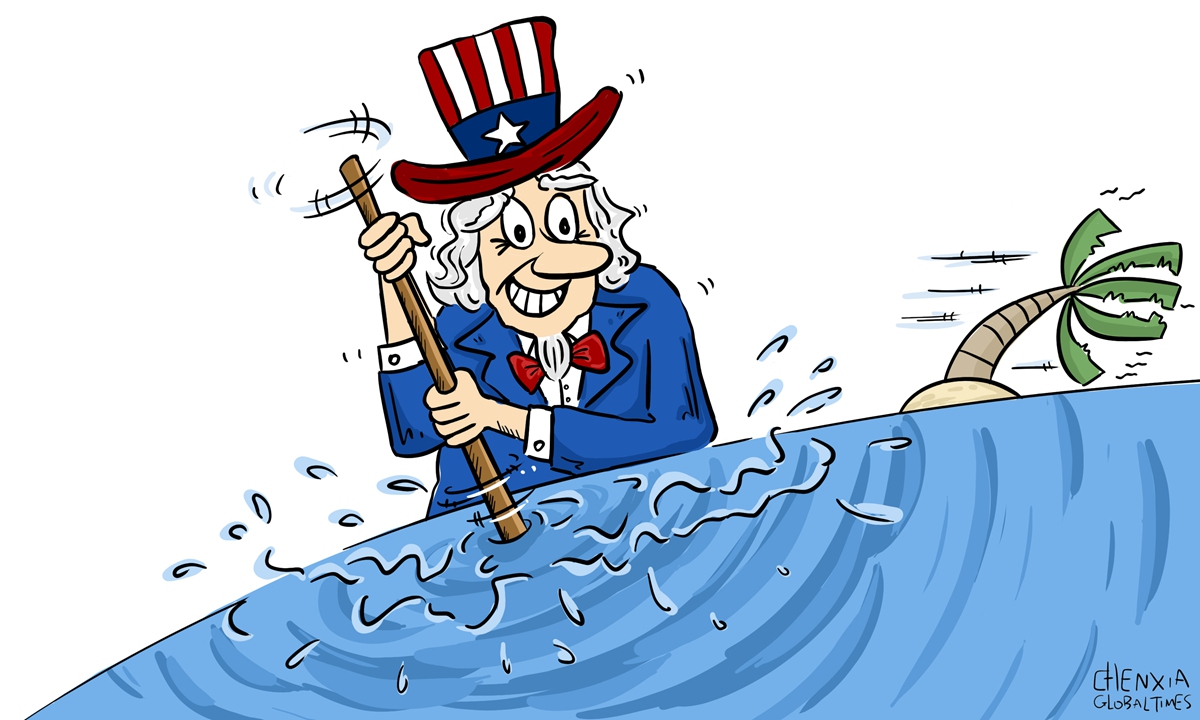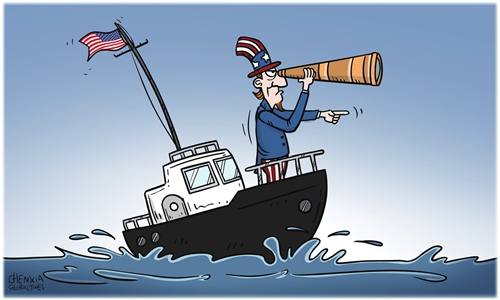
US, South China Sea Illustration: Chen Xia/GT
In their first "two-plus-two" security talks, Japan and the Philippines on Saturday agreed to forge closer defense ties while expressing "serious concern" about the situation in the East and South China Seas, citing China's "unilateral attempts to change the status quo" in the regions.
Experts noted that while Japan is becoming more provocative on the issue with the real intention of expanding its own regional influence and pleasing the US, the Philippines holds a more pragmatic and reserved attitude, as it does not want to anger China and ruin its hard-won friendly ties with China.
The foreign and defense ministers of Japan and the Philippines on Saturday struck a deal in Tokyo designated to facilitate joint exercises and reciprocal visits of their forces as China's "increasingly assertive pursuit of sovereignty claims in regional waters has upset its neighbors," Kyodo News reported.
The new treaty sought by the two Asian countries is formally called the Reciprocal Access Agreement. It will help ease restrictions on the transportation of weapons and supplies for joint training and disaster relief operations between the two countries.
While not mentioning China directly, Japanese Foreign Minister Yoshimasa Hayashi said at the outset of talks that "China's unilateral attempts to change the status quo on the back of its force are continuing in the East and South China seas."
The Saturday treaty is mostly proposed by the Japan, which reflects its growing desire to interfere in the South China Sea issues, not only in terms of tougher measures such as military actions but also the establishment of more frequent cooperation mechanisms with Southeast Asian countries, Chen Xiangmiao, an assistant research fellow at the National Institute for South China Sea Studies, told the Global Times on Sunday.
Japan's intentions are clear in its expansion of its presence in the matter. First, it does not want to see conflicts between China and the Philippines ease, nor that China takes control of the situation in the South China Sea, analysts said. It intends to draw the Philippines into their clique and meanwhile showing loyalty to the US.
Hyping the South China Sea conflicts will help Japan restrain China's military power in the East China Sea and Northeast Asia, relieving its own pressures. What's more, by mixing the East and South China Sea issues together, it will help Japan expand its military and political influence among ASEAN countries, Chen said.
In January 2015, Japan signed an agreement with the Philippines to forge closer defense ties and have since conducted nearly 20 joint naval drills. In 2021 they also held joint air force exercises.
However, the Philippines held a different attitude being positioned at the receiving end of the Saturday pact, as it does not want to anger China and harm its hard-won friendly ties with China.
During Philippine President Rodrigo Duterte's term, he has maintained a pragmatic approach in dealing with its relations with both China and the US. While strengthening partnerships with China on COVID-19 prevention and marine industries on one hand, it has not given up defense cooperation with the US or Japan either.
The US and the Philippines have just concluded one of their largest joint exercises in years in a region which the US media hyped as facing Taiwan and the South China Sea. Codenamed Balikatan 2022, the annual joint military drills included 3,800 Filipino and 5,100 US military personnel, making it the largest iteration of the Philippines-US joint drills since 2015.
Also with the Philippine presidential election coming in May, Duterte needs to act tough on the South China Sea issue so that voices from inside the country do not attack him for "being weak," Chen said.
Experts warned that if the political landscape changes after the Philippine election, the Southeast country would become a pawn of the US.
During a phone conversation with Chinese President Xi Jinping on Friday, Duterte said the Philippines is willing to properly deal with South China Sea issues with China to set an example on solving disputes peacefully and to safeguard regional peace. The Philippines is also willing to play an active role in promoting relations between ASEAN and China.
Xi stressed, the development of the current international situation has once again proved that regional security cannot be achieved by strengthening military alliances. The Chinese side is ready to work with the Philippines and other regional countries to uphold the vision of common, comprehensive, cooperative and sustainable security, keep the regional security dominance firmly in our own hands, and jointly safeguard the hard-won peace and stability in the region, so as to promote the building of a community with a shared future for mankind.



